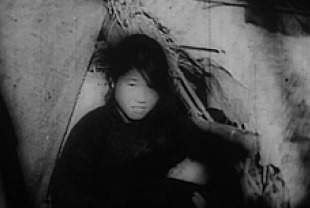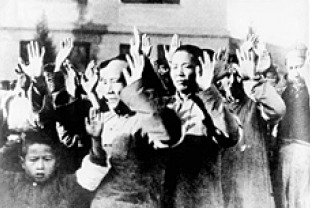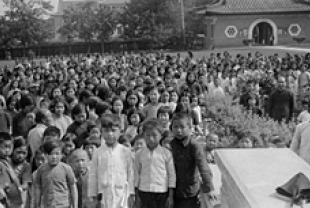Nanking was a thriving city and the capital of China before the Japanese invaded on December 13, 1937. It was the home of many Europeans and Americans, who were promptly evacuated. The poor were not so fortunate; they had no where to go. This harrowing documentary directed by Bill Guttentag and Dan Sturman charts the scourge of war through this terrible event in Chinese history.
Various actors are on-camera to read letters and diaries of some very courageous expats who stayed behind to help the thousands of stranded, starving, and wounded Chinese men, women, and children. Among these heroic individuals are Minnie Vautrin (Mariel Hemingway), head of a Christian missionary college; John Rabe (Jurgen Prochnow), a German businessman who as a Nazi tried to stop the violence; George Fitch (John Getz), a missionary who worked at the Nanking YMCA; Bob Wilson (Woody Harrelson), the only surgeon who stayed in Nanking; Lewis Smythe (Stephen Dorff), who wrote 69 letters to the Japanese army protesting their actions; and John Magee (Hugo Armstrong), who set-up a make-shift hospital for refugees and filmed atrocities he witnessed. Together these people set up a two-mile safety zone in Nanking where more than 200,000 people took refuge from the violence.
Chris Hedges writes in War Is a Force That Gives Us Meaning:
"Once we sign on for war's crusade, once we see ourselves on the side of the angels, once we embrace a theological or ideological belief system that defines itself as the embodiment of goodness and light, it is only a matter of how we will carry out murder."
This documentary charts the bloodthirstiness of the Japanese soldiers who entered Nanking after the city was severely bombed and began a systematic slaughter of 250,000 soldiers and civilians. More than 20,000 women and young girls were raped. Survivors who lived through this hellish period of occupation give eyewitness accounts of unspeakable cruelty. The documentary also includes graphic footage of wounds sustained by those subjected to the violence of Japanese soldiers.
Two elements make Nanking a morally gripping documentary: it shows the courage of a handful of people who risked their lives to take care of refugees, and it depicts the cruelty of soldiers who had been trained to see the enemy, both soldiers and civilians, as subhuman and not worthy of living.


